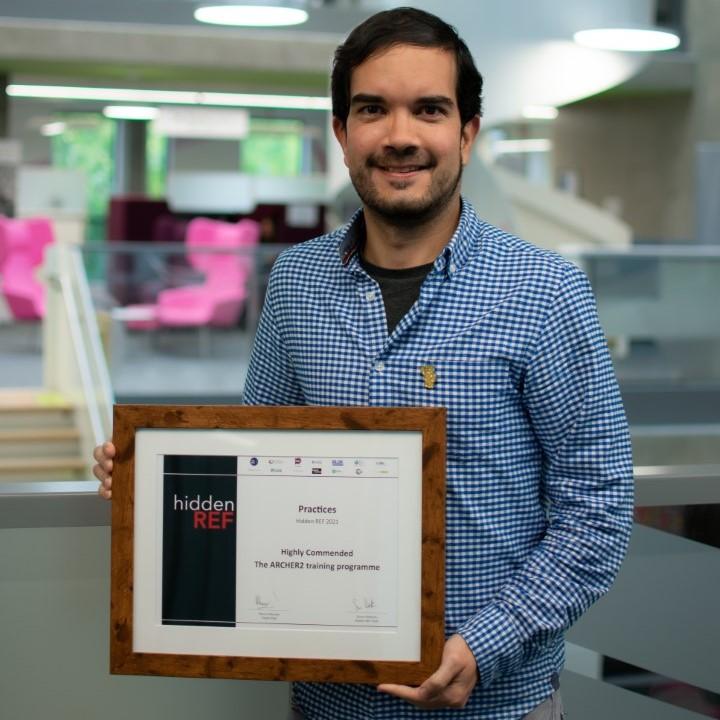The ARCHER2 training service
1 May 2023
Around three years ago, the ARCHER2 training service started with a fully online programme of interactive courses and webinars. Nowadays, we provide both online and face-to-face training in several locations around the UK.
EPCC and training
EPCC has vast experience in delivering training, with almost half of EPCC staff involved in some capacity.
We have been running training for national HPC services for over 25 years. Under the ARCHER service (2013-2020), 72 days of training per year were delivered, making a total of 446.5 days, 200 courses. Other training activities where EPCC has participated are listed below:
- PRACE Training Centre (2012-2022).
- ACM SIGHPC Education Chapter. Co-chairs of Content and Outreach sub-committees.
- Regular tutorials and workshops at SC and ISC conferences.
- Free online Supercomputing MOOC on FutureLearn, completed by almost 1,000 people.
- Hands-on courses at 9 International HPC Summer Schools since 2010 at locations around Europe, the USA and Canada.
- Training at EPSRC-funded HPC Autumn Academies in Cambridge since 2011.
EPCC runs several post-graduate programmes at The University of Edinburgh, resulting in over 300 post-graduates trained in Research Software Engineering (RSE) skills to support researchers using HPC and data science.
- MSc in High Performance Computing (available on-campus since 2001 and fully online from September 2020.
- MSc in HPC with Data Science (available on-campus since 2014 and fully online from September 2020).
- Data Science, Technology, and Innovation (University-wide online).
Other collaborations include:
- The DiRAC national HPC service.
- Centres of Excellence (Hartree Centre, Alan Turing Institute, PRACE Training Centres, Software Sustainability Institute, The Carpentries).
- Vendors (HPE, Intel, AMD, Arm, NVIDIA).
- Code developers (VASP, CASTEP, CP2K, Code_Saturne, Unified Model).
- Leading HPC projects (BioExcel, INTERTWinE, EUDAT, EuroCC, Women in HPC).
EPCC's training activity is underpinned by our ISO9001-accredited Quality Management System.
ARCHER2 training overview
Training is a function inside the Computational Science and Engineering (CSE) service, and the overall ARCHER2 service aims to provide a rich and diverse programme of training that is responsive to users' evolving needs. A minimum of 60 days of online and face-to-face interactive courses and webinars has been provided every year since the service started in 2020.
At the beginning of the training service, all training was delivered online due to the coronavirus pandemic. Since 2022, face-to-face courses have increased.
Online training has its advantages and disadvantages. One of the advantages is that no one has to travel to where the training is taking place, making arrangements more flexible and affordable. For instance, I was able to easily attend an online course delivered from France. On the other hand, an important aspect such as communication with your course peers and instructors is not the same when the course is delivered online. The use of the course chat and breakout rooms may alleviate that lack of interaction, but it does not replace effectively an in-person conversation. For the instructor’s point of view, it is more difficult to get instant feedback from the attendees. The instructor talks in front of a screen and cannot see the reactions of the course audience. Some interactions are based on body language, and this is difficult to read when the course is delivered online. For that reason, course formats such as the Carpentries are better suited to be delivered in person, although online delivery is also feasible.
At the beginning of 2022, we surveyed past ARCHER2 course attendees in order to assess an appropriate balance of online and face-to-face courses. A sizeable percentage of respondents (46%) found online courses better than face-to-face, while a significant percentage (32%) indicated that depends on several factors such as course level, location, etc. Online courses are still preferred for future courses (87%), with a small percentage (6%) of respondents who prefer face-to-face courses. We understand that these results are a snapshot of the situation in early 2022, and the thoughts may have evolved. Nowadays, we offer both online and face-to-face training to reach a larger audience and offer options to those who prefer one format over the other.
Hidden REF 2021
The Hidden REF competition recognised all research outputs and every role that makes research possible. The ARCHER2 training programme was highly commended under the Practices panel.

ARCHER2 course delivery: innovation and tools
Blackboard Collaborate is our default platform for the delivery of online training, although Zoom may also be used. Both platforms can host a large number of participants and provide similar features, such as breakout rooms, chat, recordings, etc. Both are provided and supported by the University of Edinburgh.
Alongside the course chat offered by Blackboard Collaborate or Zoom, a collaborative note-taking tool called Etherpad is also available. Edits can be done in real time, allowing everyone to make changes.
Once the registration form is submitted, the delegate receives a confirmation email. Several days before the course, the delegate receives another email with the course material, the calendar invitation, and instructions on how to create an ARCHER2 account if required. This account is valid for a month after the course takes place to allow users to practise and put skills into action.
Material from all online courses, including videos of the lectures, has been made freely available on the course website page after the live event. Course materials are available via GitHub under the CC BY-NC-SA 4.0 license. Online session recordings are uploaded to the ARCHER2 YouTube channel.
Courses are funded by UKRI and therefore free for academics.
Accessibility and diversity
Course materials are available on the ARCHER2 webpage at least 24 hours in advance. Building and room are accessible to those who cannot use stairs: this includes teaching rooms, catering, and toilet facilities. There is a microphone for instructors. We also prefer rooms to be equipped with a hearing induction loop, though if required we can provide a portable loop. The ARCHER2 website follows the WCAG guidelines (level AA). We have a Diversity and Inclusion Policy, which promotes a welcoming and positive learning environment on all our courses. The ARCHER2 Code of Conduct (based on The Carpentries CoC) is also followed.
ARCHER2 training catalogue
We have classified the ARCHER2 courses into three levels:
- Introductory: requiring no substantial programming skills or knowledge of HPC; these courses only assume basic computer literacy.
- Intermediate: these require some existing knowledge, for example the ability to program in C or Fortran, or experience of running parallel applications on HPC systems.
- Advanced: these require an existing knowledge of parallel programming.
To cater for different types of users, there are training tracks aimed specifically at:
- Package users, who primarily use existing research software packages for their research.
- Software developers, who develop research software packages for their own research or for use by the wider research community.
- Data scientists, who apply data science tools and techniques using data processing frameworks such as Spark as well as packages for data analysis, machine learning, and deep learning.
For the three profiles listed above, we offer tailored courses.
The Carpentries workshops cover foundational computational and data science skills. Lessons delivered using evidence-based teaching practices. We offer Software Carpentry, Data Carpentry, and HPC Carpentry.
We have several courses that focused on specific software packages available on the ARCHER2 centrally supported package catalogue. The chosen packages are directed by requests from the user community and the various feedback mechanisms described before. Past/current courses include LAMMPS, Code_Saturne, Unified Model, CP2K, and GROMACS.
Intermediate courses cover concepts such as reproducible computational environments using containers, MPI, OpenMP, C++, and Fortran. Advanced courses include “Performance Optimisation on AMD EPYC”, “Efficient use of the HPE EX system ARCHER2”, and courses on performance analysis using profiling tools.
Virtual tutorials
We host interactive live webinars where experts share their knowledge on a range of intermediate and advanced topics. The usual slot is on Wednesdays at 3pm UK time, and past recordings are available on the ARCHER2 webinars page.
Self-service courses
In addition to the 60 days of scheduled training, we provide a set of online self-service courses to allow people to access training when it suits them. These courses are specifically tailored to be followed at a user’s own pace. Available self-taught courses are:
- Shared-memory programming with OpenMP.
- Message-passing programming with MPI.
- QM/MM with GROMACS + CP2K.
A Mattermost chat is available to ask questions and be in touch with the course tutors.
ARCHER2 Driving Test
The ARCHER2 driving test, modelled on the previous ARCHER driving test, is a multiple-choice online exam based on the training material available online on the ARCHER2 website. Anyone who passes this test can apply for an ARCHER2 account with a small amount of compute time. There are several versions, depending on the user profile (package users, software developers, etc.). The ARCHER2 Driving Test lowers barriers to access and ensures that anyone with key basic knowledge can get access to try out ARCHER2 for their research.
Summary
The ARCHER2 training service aims to address the needs of all users and enable them to make efficient use of ARCHER2. All can be found here on the ARCHER2 training page.
Key points:
- Training tracks aimed at package users, developers, and data scientists.
- Improved accessibility and inclusivity of HPC training.
- A training programme that is flexible and responsive to users’ needs.
- User Training Forum and Training Panel.
- Collaboration with the community.
- Providing internationally recognised leadership in the HPC and data science training community.
- An approach to training that offers diversity in subject areas, pedagogical approaches, and delivery mechanisms.
- A training programme that is open to all researchers.

